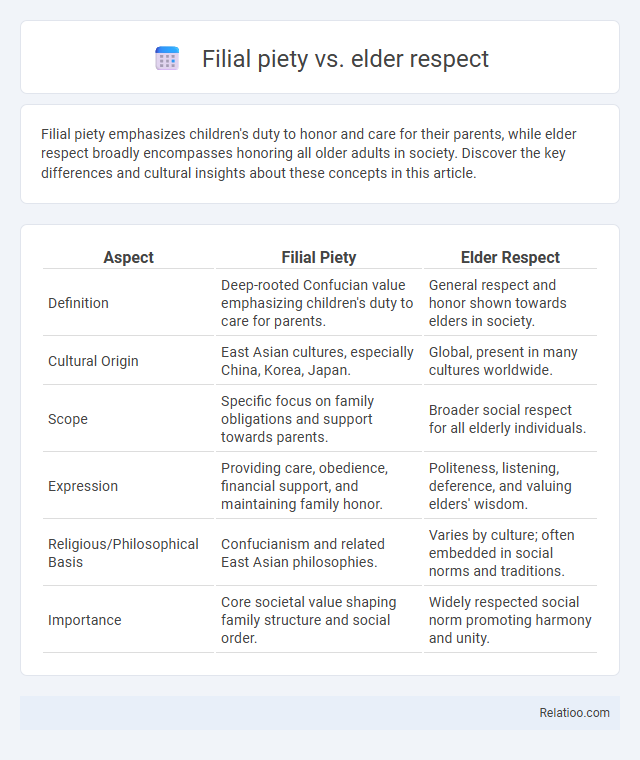Filial piety emphasizes children's duty to honor and care for their parents, while elder respect broadly encompasses honoring all older adults in society. Discover the key differences and cultural insights about these concepts in this article.
Table of Comparison
| Aspect | Filial Piety | Elder Respect |
|---|---|---|
| Definition | Deep-rooted Confucian value emphasizing children's duty to care for parents. | General respect and honor shown towards elders in society. |
| Cultural Origin | East Asian cultures, especially China, Korea, Japan. | Global, present in many cultures worldwide. |
| Scope | Specific focus on family obligations and support towards parents. | Broader social respect for all elderly individuals. |
| Expression | Providing care, obedience, financial support, and maintaining family honor. | Politeness, listening, deference, and valuing elders' wisdom. |
| Religious/Philosophical Basis | Confucianism and related East Asian philosophies. | Varies by culture; often embedded in social norms and traditions. |
| Importance | Core societal value shaping family structure and social order. | Widely respected social norm promoting harmony and unity. |
Defining Filial Piety and Elder Respect
Filial piety is a fundamental virtue in many cultures, emphasizing deep respect, care, and obedience toward one's parents and ancestors, often involving specific duties and rituals. Elder respect extends beyond family boundaries, promoting reverence and courteous behavior toward all older individuals in your community, regardless of direct familial ties. Understanding these distinctions helps you appreciate how societal values shape intergenerational relationships and cultural traditions.
Historical Origins and Cultural Contexts
Filial piety, rooted in Confucianism, emphasizes deep respect and duty toward one's parents and ancestors, shaping East Asian family dynamics and social hierarchies for centuries. Elder respect, while overlapping with filial piety, extends beyond family to include community and social interactions across various cultures, reflecting broader societal values on age and wisdom. Historical origins of filial piety are primarily linked to ancient Chinese texts like the Analects, whereas elder respect appears in diverse cultural contexts worldwide, including Indigenous traditions and Western societies, highlighting different cultural paradigms of honoring elders.
Filial Piety in Eastern Societies
Filial piety is a cornerstone of Eastern societies, emphasizing deep respect, obedience, and care for one's parents and ancestors, which shapes family dynamics and social harmony. Unlike general elder respect, filial piety entails prescribed duties and moral obligations that sustain cultural continuity and reinforce hierarchical family structures. Your understanding of these values highlights how Eastern traditions prioritize family loyalty and intergenerational support as fundamental virtues.
Elder Respect in Western Traditions
Elder respect in Western traditions emphasizes honoring the wisdom, experience, and autonomy of older adults, often through formal recognition, care, and social inclusion rather than strict familial obligation. Unlike filial piety, which mandates specific duties from children to parents rooted in Confucian values, elder respect in the West is expressed through community support, legal protections, and personal choice. Your approach to elder respect may align more with fostering independence and dignity while maintaining strong relational bonds.
Key Differences Between Filial Piety and Elder Respect
Filial piety primarily refers to the virtue of respecting and caring for one's parents and ancestors, emphasizing duties within the family lineage, while elder respect extends to showing deference and honor to all elderly individuals regardless of familial ties. Filial piety is deeply rooted in Confucian philosophy, focusing on obedience, care, and maintaining family hierarchy, whereas elder respect is a broader social value promoting kindness and reverence toward senior members of the community. The key difference lies in the scope: filial piety is family-specific and obligation-based, whereas elder respect is inclusive of elders in general and centers on social etiquette and moral regard.
The Role of Family Structure and Social Norms
Family structure deeply influences filial piety by defining the expectations for children's care and respect toward elders, often rooted in Confucian traditions emphasizing hierarchy and duty. Social norms reinforce elder respect, shaping behaviors through communal approval and cultural rituals that prioritize honoring older generations. Your understanding of these concepts highlights how both family dynamics and societal values intertwine to maintain intergenerational bonds and societal harmony.
Impact on Intergenerational Relationships
Filial piety emphasizes children's duty to care for and honor their parents, fostering strong intergenerational bonds through respect and responsibility. Elder respect, while also valuing reverence for seniors, broadens to include respect for all older individuals, promoting social harmony beyond the family unit. Filial piety's focused obligation strengthens emotional connections and ensures support systems within families, significantly influencing the quality of intergenerational relationships.
Contemporary Challenges and Shifting Values
Contemporary challenges to filial piety, elder respect, and their overlapping values arise from urbanization, globalization, and changing family dynamics that place increased demands on younger generations balancing work and caregiving. Your understanding of elder respect must adapt to acknowledge shifting societal norms where traditional hierarchical relationships intersect with modern views on individual autonomy and mutual support. Filial piety today struggles to maintain relevance as younger family members reconcile cultural expectations with their personal and professional lives amid evolving social values.
Globalization and Cultural Exchange
Filial piety, rooted in Confucian values emphasizing duty and care for one's parents, contrasts with elder respect in diverse cultures that prioritize honor and social status regardless of lineage. Globalization fosters cultural exchange, blending these concepts and creating new interpretations of family and societal roles across different societies. This dynamic interplay promotes a more inclusive understanding of intergenerational respect, adapting traditional values to contemporary global contexts.
The Future of Filial Piety and Elder Respect
The future of filial piety and elder respect hinges on adapting traditional values to contemporary societal changes such as urbanization and increased life expectancy. Innovations in elder care technologies, alongside policy reforms in countries like China and Japan, aim to balance familial obligations with professional care services. Emphasizing mutual respect and autonomy for the elderly fosters sustainable intergenerational relationships amid shifting cultural dynamics.

Infographic: Filial piety vs Elder respect
 relatioo.com
relatioo.com